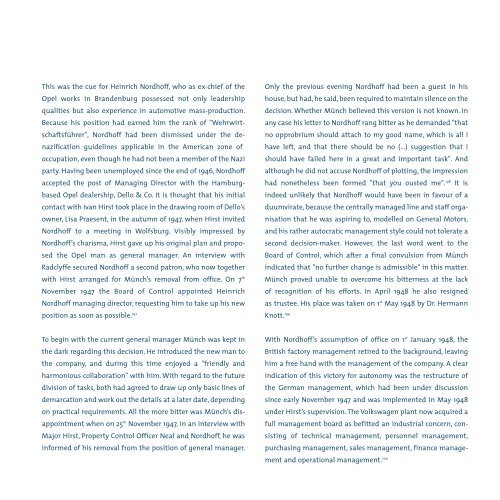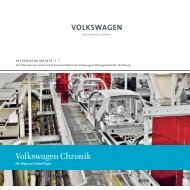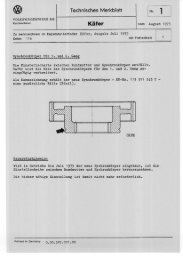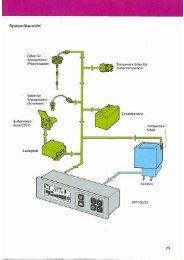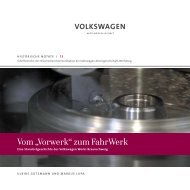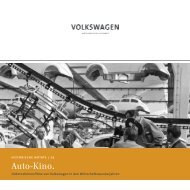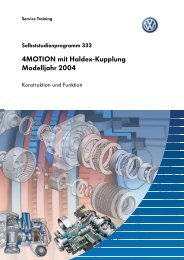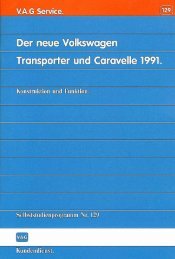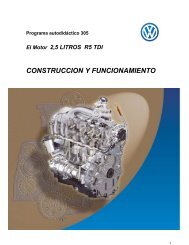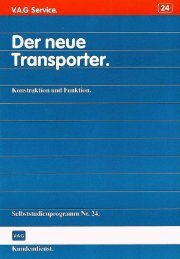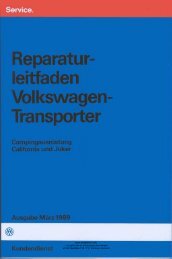HN 2: The British and their Works
HN 2: The British and their Works
HN 2: The British and their Works
Create successful ePaper yourself
Turn your PDF publications into a flip-book with our unique Google optimized e-Paper software.
This was the cue for Heinrich Nordhoff, who as ex-chief of the<br />
Opel works in Br<strong>and</strong>enburg possessed not only leadership<br />
qualities but also experience in automotive mass-production.<br />
Because his position had earned him the rank of "Wehrwirtschaftsführer",<br />
Nordhoff had been dismissed under the denazification<br />
guidelines applicable in the American zone of<br />
occupation, even though he had not been a member of the Nazi<br />
party. Having been unemployed since the end of 1946, Nordhoff<br />
accepted the post of Managing Director with the Hamburgbased<br />
Opel dealership, Dello & Co. It is thought that his initial<br />
contact with Ivan Hirst took place in the drawing room of Dello’s<br />
owner, Lisa Praesent, in the autumn of 1947, when Hirst invited<br />
Nordhoff to a meeting in Wolfsburg. Visibly impressed by<br />
Nordhoff’s charisma, Hirst gave up his original plan <strong>and</strong> proposed<br />
the Opel man as general manager. An interview with<br />
Radclyffe secured Nordhoff a second patron, who now together<br />
with Hirst arranged for Münch’s removal from office. On 7th November 1947 the Board of Control appointed Heinrich<br />
Nordhoff managing director, requesting him to take up his new<br />
position as soon as possible. 197<br />
To begin with the current general manager Münch was kept in<br />
the dark regarding this decision. He introduced the new man to<br />
the company, <strong>and</strong> during this time enjoyed a "friendly <strong>and</strong><br />
harmonious collaboration" with him. With regard to the future<br />
division of tasks, both had agreed to draw up only basic lines of<br />
demarcation <strong>and</strong> work out the details at a later date, depending<br />
on practical requirements. All the more bitter was Münch’s disappointment<br />
when on 25th November 1947, in an interview with<br />
Major Hirst, Property Control Officer Neal <strong>and</strong> Nordhoff, he was<br />
informed of his removal from the position of general manager.<br />
Only the previous evening Nordhoff had been a guest in his<br />
house, but had, he said, been required to maintain silence on the<br />
decision. Whether Münch believed this version is not known. In<br />
any case his letter to Nordhoff rang bitter as he dem<strong>and</strong>ed "that<br />
no opprobrium should attach to my good name, which is all I<br />
have left, <strong>and</strong> that there should be no (…) suggestion that I<br />
should have failed here in a great <strong>and</strong> important task". And<br />
although he did not accuse Nordhoff of plotting, the impression<br />
had nonetheless been formed "that you ousted me". 198 It is<br />
indeed unlikely that Nordhoff would have been in favour of a<br />
duumvirate, because the centrally managed line <strong>and</strong> staff organisation<br />
that he was aspiring to, modelled on General Motors,<br />
<strong>and</strong> his rather autocratic management style could not tolerate a<br />
second decision-maker. However, the last word went to the<br />
Board of Control, which after a final convulsion from Münch<br />
indicated that "no further change is admissible" in this matter.<br />
Münch proved unable to overcome his bitterness at the lack<br />
of recognition of his efforts. In April 1948 he also resigned<br />
as trustee. His place was taken on 1st May 1948 by Dr. Hermann<br />
Knott. 199<br />
With Nordhoff’s assumption of office on 1st January 1948, the<br />
<strong>British</strong> factory management retired to the background, leaving<br />
him a free h<strong>and</strong> with the management of the company. A clear<br />
indication of this victory for autonomy was the restructure of<br />
the German management, which had been under discussion<br />
since early November 1947 <strong>and</strong> was implemented in May 1948<br />
under Hirst’s supervision. <strong>The</strong> Volkswagen plant now acquired a<br />
full management board as befitted an industrial concern, consisting<br />
of technical management, personnel management,<br />
purchasing management, sales management, finance management<br />
<strong>and</strong> operational management. 200


